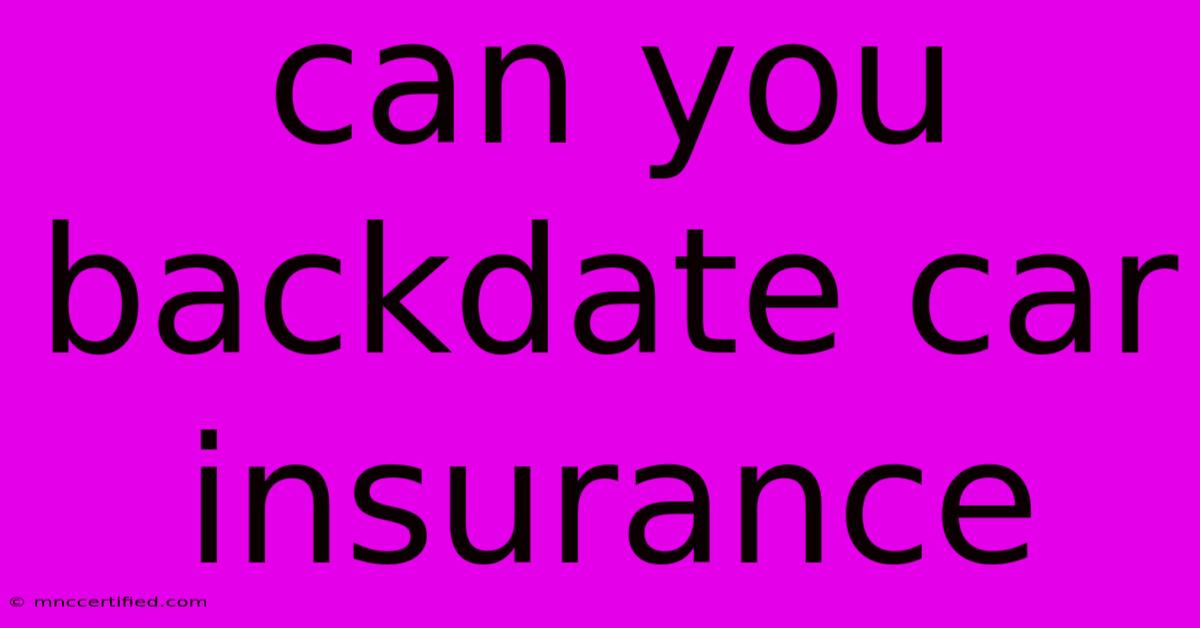Can You Backdate Car Insurance

Table of Contents
Can You Backdate Car Insurance? A Comprehensive Guide
Thinking about backdating your car insurance? It's a common question, but the answer isn't a simple yes or no. While technically possible in some circumstances, it's crucial to understand the legal and practical implications before attempting it. This comprehensive guide will delve into the complexities of backdating car insurance, exploring when it might be acceptable, the potential pitfalls, and the best ways to avoid problems altogether.
Understanding the Risks of Backdating Car Insurance
Before we explore the limited scenarios where backdating might be considered, let's address the significant risks involved. Driving without valid insurance is illegal and carries severe consequences. These can include:
- Heavy fines: The penalties for driving uninsured vary by location but can be substantial, potentially running into thousands of dollars.
- Driving license suspension or revocation: Losing your driving privileges can have a devastating impact on your life, affecting your ability to commute, work, and conduct daily activities.
- Increased insurance premiums: Even if you manage to avoid the harshest penalties, attempting to backdate your insurance will likely result in significantly higher premiums in the future. Insurers view it as a serious breach of trust.
- Difficulty obtaining future insurance: Your insurance history will reflect the incident, making it harder to secure affordable coverage in the future.
- Legal action: In the event of an accident, you could face legal action and be held personally liable for damages if you were uninsured at the time.
When Might Backdating Be Considered (and Why it's Usually Not Recommended)?
There are extremely rare instances where an insurance provider might consider backdating. This usually involves situations where there's a demonstrable administrative error on their part, such as a delay in processing your application. However, even in these limited cases, it's not guaranteed. Your insurer will thoroughly investigate the situation, and it's highly likely they'll require substantial evidence to support your claim. Attempting to backdate for reasons other than a clear administrative error is almost always unsuccessful and highly risky.
The Legitimate Way to Ensure Continuous Coverage
Instead of attempting to backdate, the safest and most recommended approach is to maintain continuous car insurance coverage. This means ensuring your policy is active without any gaps in coverage. Here's how to do it:
- Plan ahead: Don't wait until the last minute to renew your policy. Allow ample time to compare quotes and choose a suitable plan before your current policy expires.
- Set reminders: Use calendar reminders or utilize your insurer's automatic renewal options to ensure you don't miss renewal deadlines.
- Inform your insurer of any changes: If you change vehicles, addresses, or drivers, immediately inform your insurer to avoid potential coverage issues.
- Review your policy regularly: Familiarize yourself with the terms and conditions of your policy to understand your coverage limits and responsibilities.
Key Takeaways: Avoiding the Backdating Trap
Backdating car insurance is a risky maneuver with potentially severe consequences. While extremely rare exceptions might exist due to insurer errors, attempting to backdate for other reasons is almost certainly going to cause significant problems. Focusing on maintaining continuous coverage is the far safer and more responsible approach to ensuring you're legally protected on the road. Remember, the potential penalties far outweigh any perceived benefits of trying to backdate your policy. Always prioritize responsible insurance practices to safeguard yourself and your finances.

Thank you for visiting our website wich cover about Can You Backdate Car Insurance. We hope the information provided has been useful to you. Feel free to contact us if you have any questions or need further assistance. See you next time and dont miss to bookmark.
Featured Posts
-
Country Girl Song Lainey Wilson Spin
Nov 27, 2024
-
Aberdeen Fc Scraps Fan Zone Alcohol
Nov 27, 2024
-
Insurance Conference Las Vegas
Nov 27, 2024
-
Midwife Cost Without Insurance
Nov 27, 2024
-
Dhl Express Egypts 2025 Investment
Nov 27, 2024